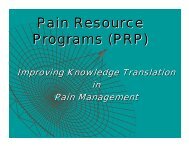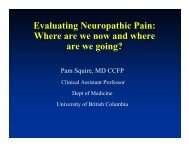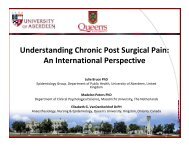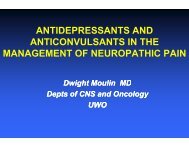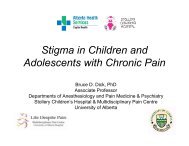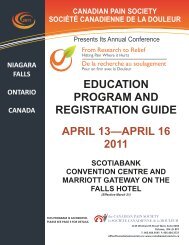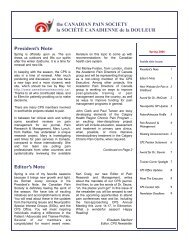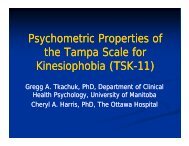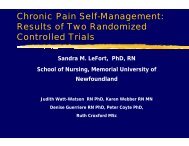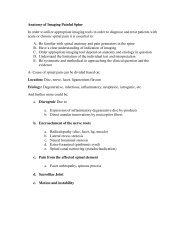Registration & Program Guide - The Canadian Pain Society
Registration & Program Guide - The Canadian Pain Society
Registration & Program Guide - The Canadian Pain Society
You also want an ePaper? Increase the reach of your titles
YUMPU automatically turns print PDFs into web optimized ePapers that Google loves.
34TH ANNUAL SCIENTIFIC MEETING<br />
CONFERENCE PROGRAM - THURSDAY MAY 9, 2013 (cont’d)<br />
SESSION 202<br />
MOBILE (M-HEALTH) AND WEB-BASED TECHNOLOGY TO SHAPE THE FUTURE OF PAIN SELF-MANAGEMENT FOR ADOLESCENTS<br />
AND YOUNG ADULTS WITH CHRONIC AND LIFE-LIMITING CONDITIONS<br />
11:00 am – 12:00 pm<br />
Chair: Susan Tupper, PT, PhD, School of Physical <strong>The</strong>rapy, University of Saskatchewan, Saskatoon, Saskatchewan<br />
Speakers: Susan Tupper, PT, PhD, School of Physical <strong>The</strong>rapy, University of Saskatchewan, Saskatoon, Saskatchewan;<br />
Chitra Lalloo, BHSc, PhD(c), McMaster University, Hamilton, Ontario; Lindsay Jibb, RN, MSc, University of Toronto, Toronto, Ontario<br />
WORKSHOP OBJECTIVE:<br />
<strong>The</strong> overall aim of this session is to describe novel information and communication technologies (Smartphone and<br />
Internet-based) to improve the self-management of pain for adolescents and young adults. Dr. Tupper will provide an<br />
overview of the advantages and disadvantages associated with these technologies and outline the stages in their<br />
development and evaluation. Ms. Lalloo and Jibb will discuss two real-world examples of pain self-management tools for<br />
young people living with painful chronic and life-threatening health conditions. Ms. Lalloo will describe the development<br />
of iCanCope with <strong>Pain</strong>, an integrated Smartphone app and website for adolescents and young adults with chronic pain.<br />
Ms. Jibb will outline the process of developing a rule-based mobile clinical decision support system for children and<br />
adolescents living with persistent cancer pain.<br />
Learning Objectives:<br />
1. To understand the potential benefits of mobile and web-based technology to the field of pain self-management.<br />
2. To understand the theoretical and methodological underpinnings in the development and evaluation of novel<br />
mobile and web-based pain self-management tools with a particular focus on end-user involvement.<br />
3. To recognize the challenges associated with the design and implementation of these new technologies and discuss<br />
the future of this field.<br />
APPLICATION OF M-HEALTH AND E-HEALTH TECHNOLOGIES TO IMPROVING THE MANAGEMENT OF PAIN IN ADOLESCENTS<br />
AND YOUNG ADULTS<br />
Susan Tupper, PT, PhD, School of Physical <strong>The</strong>rapy, University of Saskatchewan, Saskatoon, Saskatchewan<br />
“THERE’S A PAIN APP FOR THAT”: PROMOTING PAIN SELF-MANAGEMENT AMONG ADOLESCENTS AND YOUNG ADULTS<br />
Chitra Lalloo, BHSc, PhD(c), McMaster University, Hamilton, Ontario<br />
DEVELOPING A SMARTPHONE-BASED PAIN MANAGEMENT TOOL FOR ADOLESCENTS WITH CANCER: ESTABLISHMENT OF<br />
STANDARDIZED TREATMENT ALGORITHMS<br />
Lindsay Jibb, RN, MSc, University of Toronto, Toronto, Ontario<br />
SESSION 203<br />
THE INFLUENCE OF PAIN ON REWARD PROCESSING AND POTENTIAL CLINICAL IMPLICATIONS<br />
11:00 am – 12:00 pm<br />
Chair: Petra Schweinhardt, MD, PhD, McGill University, Montreal, Quebec<br />
Speakers: Petra Schweinhardt, MD, PhD, McGill University, Montreal, Quebec; Catherine Cahill, PhD, Associate Professor,<br />
Department of Anaesthesiology & Perioperative Care, University of California, Irvine, California<br />
WORKSHOP OBJECTIVE:<br />
Avoiding pain and seeking reward are two fundamental motivations for an organism. It is therefore not surprising that pain<br />
and reward interact and influence each other. In this workshop, it will be discussed how pain influences reward processing<br />
and, on the flip side, how reward influences pain processing. We will look at the interaction between acute pain and reward<br />
processing in healthy individuals with respect to behavior and brain processing. Further, alterations of reward processing<br />
circuitry in chronic pain states will be demonstrated and potential mechanisms underlying such alterations will be discussed.<br />
Potential clinical implications of pain-influences on reward processing and altered reward circuitry in chronic pain will<br />
be addressed.<br />
Learning Objectives:<br />
1. Understand the reciprocal influences that pain and reward have on each other.<br />
2. Learn about effects of persistent pain on reward processing circuitry in the brain.<br />
3. Appreciate the clinical implications of altered reward processing circuitry in chronic pain patients.<br />
THE PAIN-REWARD CONNECTION: EVIDENCE FROM HUMAN VOLUNTEERS<br />
Petra Schweinhardt, MD, PhD, McGill University, Montreal, Quebec<br />
OPIOID REWARD SWITCHES TO A DOPAMINE-DEPENDENT PROCESS IN CHRONIC PAIN: IMPLICATIONS FOR ACTIVATED<br />
GLIA IN THE BRAIN<br />
Catherine Cahill, PhD, Associate Professor, Department of Anaesthesiology & Perioperative Care, University of California,<br />
Irvine, California<br />
34TH ANNUAL SCIENTIFIC MEETING <strong>Program</strong> and <strong>Registration</strong> <strong>Guide</strong> 2013 PAGE 17



